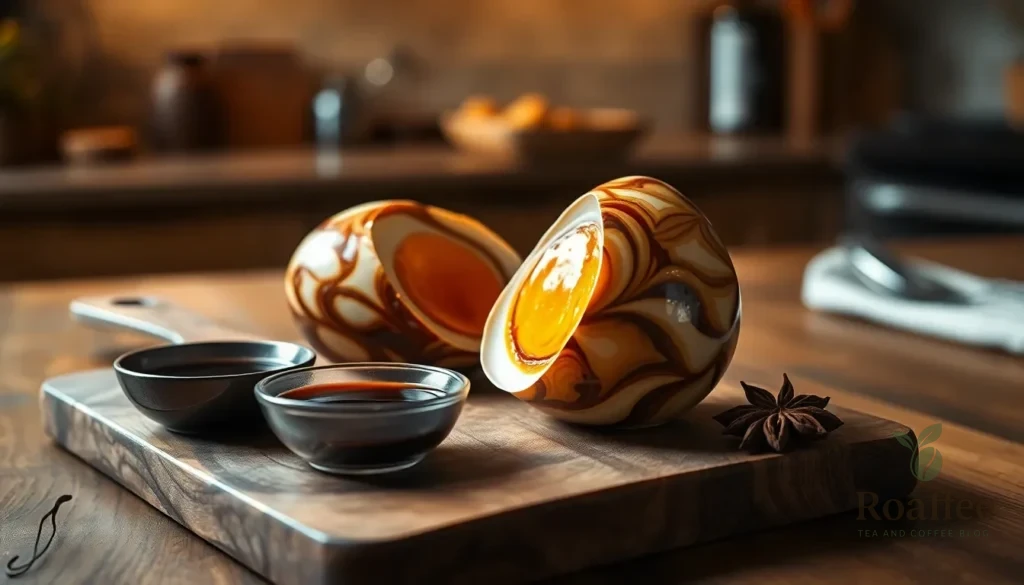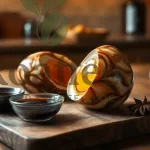We’ve all seen those beautiful marbled eggs in Asian restaurants and wondered how to recreate that stunning cracked pattern at home. Tea eggs are a beloved Chinese street food that transforms ordinary hard-boiled eggs into aromatic masterpieces with their distinctive web-like appearance and rich, savory flavor.
This ancient cooking technique combines the comfort of perfectly cooked eggs with the complex flavors of soy sauce, star anise, and black tea. The magic happens when we crack the shells and let the eggs simmer in a fragrant braising liquid that seeps through every fissure.
What makes tea eggs so irresistible isn’t just their Instagram-worthy appearance – it’s the way each bite delivers layers of umami-rich flavor that’ll transport you straight to the bustling streets of Taiwan or Hong Kong. We’ll show you how to master this surprisingly simple technique that turns humble eggs into an elegant snack or appetizer.
Ingredients
Creating perfect tea eggs requires two essential components: fresh eggs and a flavorful marinade blend. We’ll walk you through each ingredient needed to achieve that signature marbled appearance and rich umami taste.
For the Tea Egg Marinade
- 4 cups water
- 1/4 cup dark soy sauce
- 2 tablespoons light soy sauce
- 2 tablespoons brown sugar
- 3 black tea bags or 2 tablespoons loose black tea
- 2 star anise pods
- 1 cinnamon stick
- 1 teaspoon five-spice powder
- 1 teaspoon salt
- 2 cloves garlic, smashed
- 1 piece fresh ginger (1-inch), sliced
- 2 dried shiitake mushrooms (optional)
- 1 tablespoon Shaoxing wine or dry sherry (optional)
For Boiling the Eggs
- 8 large eggs, room temperature
- Water for boiling
- 1 tablespoon white vinegar
- Ice water for cooling bath
Equipment Needed
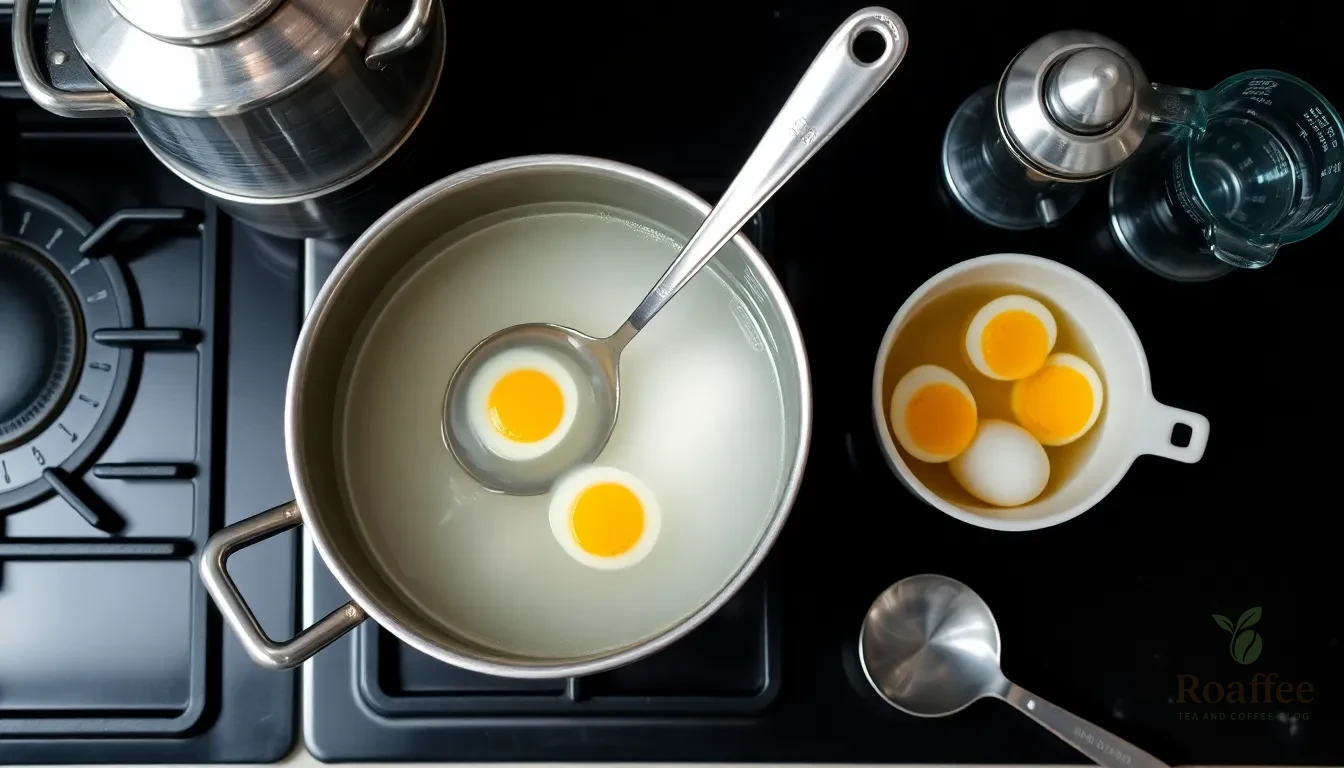
Creating perfect tea eggs requires exact kitchen tools that ensure both safety and optimal results. We recommend gathering these essential items before starting your cooking process.
A medium to large pot serves as the foundation for boiling eggs and simmering the aromatic tea mixture. The pot should be spacious enough to hold 10-12 eggs comfortably while allowing room for the marinade to circulate freely.
Slotted spoons or tongs become indispensable tools for safely handling hot eggs throughout the cooking process. These implements prevent burns while allowing you to transfer eggs efficiently from boiling water to ice baths.
A bowl designated for ice water bath helps stop the cooking process immediately after boiling. This rapid cooling technique prevents overcooking and makes the eggs easier to crack without damaging the whites.
The back of a regular spoon works perfectly for creating the signature cracks in the eggshells. We use this gentle tapping method to achieve the beautiful marbled pattern that makes tea eggs so visually appealing.
A container or pot with a tight-fitting lid provides the ideal environment for marinating eggs. The lid ensures the aromatic flavors penetrate deeply while preventing evaporation during the long soaking process.
Measuring cups and spoons guarantee accurate proportions of soy sauce, spices, and other marinade components. Precision in measurements directly impacts the final flavor balance of your tea eggs.
These basic kitchen tools work together to transform simple hard-boiled eggs into the complex, flavorful tea eggs that have captivated food lovers across Asia and beyond.
Instructions
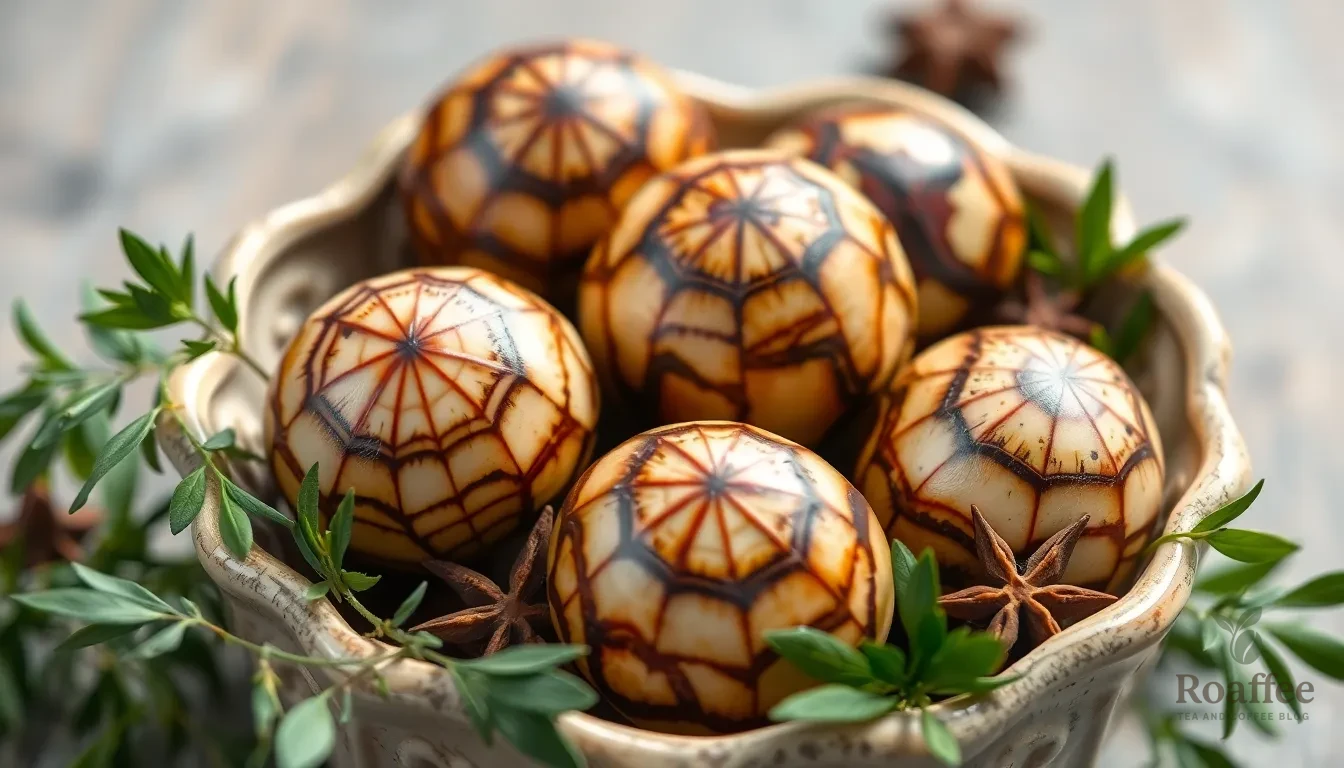
Now that we have gathered our ingredients and equipment, let’s walk through the step-by-step process to create these stunning marbled tea eggs. The technique requires patience and attention to detail, but the results are absolutely worth the effort.
Prep the Eggs
Remove the eggs from the refrigerator and let them sit at room temperature for about 30 minutes before cooking. This prevents the shells from cracking during the initial boiling process. Fill a medium to large pot with enough water to cover the eggs completely, then bring it to a rolling boil over high heat.
Gently lower the eggs into the boiling water using a slotted spoon to avoid splashing. Set a timer based on your desired yolk consistency: 4 minutes for runny yolks, 7 minutes for medium, or 10 minutes for hard-boiled. While the eggs cook, prepare an ice water bath in a large bowl to stop the cooking process immediately.
Transfer the cooked eggs to the ice water bath using tongs or a slotted spoon. Allow them to cool for at least 5 minutes before handling. This cooling step makes the eggs easier to crack and prevents overcooking.
Make the Tea Marinade
Combine 4 cups of water with both dark and light soy sauce in your cooking pot. Add the brown sugar and salt, stirring until completely dissolved. Drop in the black tea bags or loose tea leaves along with the star anise, cinnamon stick, and five-spice powder.
Crush the garlic cloves with the flat side of a knife and add them to the pot along with the sliced ginger. If using dried shiitake mushrooms, add them now for extra umami depth. Pour in the Shaoxing wine if desired.
Bring the mixture to a boil over medium-high heat, then reduce to a gentle simmer. Let the marinade simmer for 10-15 minutes to allow all the flavors to meld together. The liquid should take on a deep amber color and release an aromatic blend of tea and spices.
Cook the Eggs
Return the cooled eggs to the simmering marinade, ensuring they are completely submerged. The liquid should cover the eggs by at least an inch. If needed, add more water to achieve proper coverage.
Maintain a gentle simmer and cook the eggs in the marinade for 20 minutes. This initial cooking allows the flavors to begin penetrating the shells. The eggs will start developing their characteristic color during this stage.
Use a slotted spoon to carefully remove the eggs from the hot marinade. Place them on a plate or cutting board where you can work with them safely. Reserve the marinade as we will use it again for the final marinating step.
Create the Cracked Shell Pattern
Take each egg and gently tap it all over with the back of a regular spoon, creating a network of small cracks. Work systematically around the entire surface, ensuring the cracks are evenly distributed but not too deep.
The goal is to create hairline fractures that allow the marinade to seep through without breaking the eggs apart completely. Think of creating a spider web pattern across the shell surface. These cracks will become the beautiful marbled lines that make tea eggs so visually striking.
Handle each egg carefully during this process, as the shells are more fragile after cooking. The cracking technique takes practice, so don’t worry if your first attempts aren’t perfect.
Marinate the Eggs
Return the cracked eggs to the reserved marinade, making sure they are fully submerged. For more efficient marinating, transfer everything to a container with a tight-fitting lid or use a large zip-top bag to minimize the amount of marinade needed.
Refrigerate the eggs in the marinade for at least 4 hours, though overnight marinating produces the most dramatic results. The longer marination time allows the tea and spice flavors to penetrate deeper into the egg whites, creating more pronounced marbling.
Turn the eggs occasionally during the marinating process to ensure even color distribution. After marinating, carefully peel away the cracked shells to reveal the beautiful marbled pattern underneath. The eggs are now ready to serve as a snack, appetizer, or noodle topping.
Directions for Perfect Tea Eggs
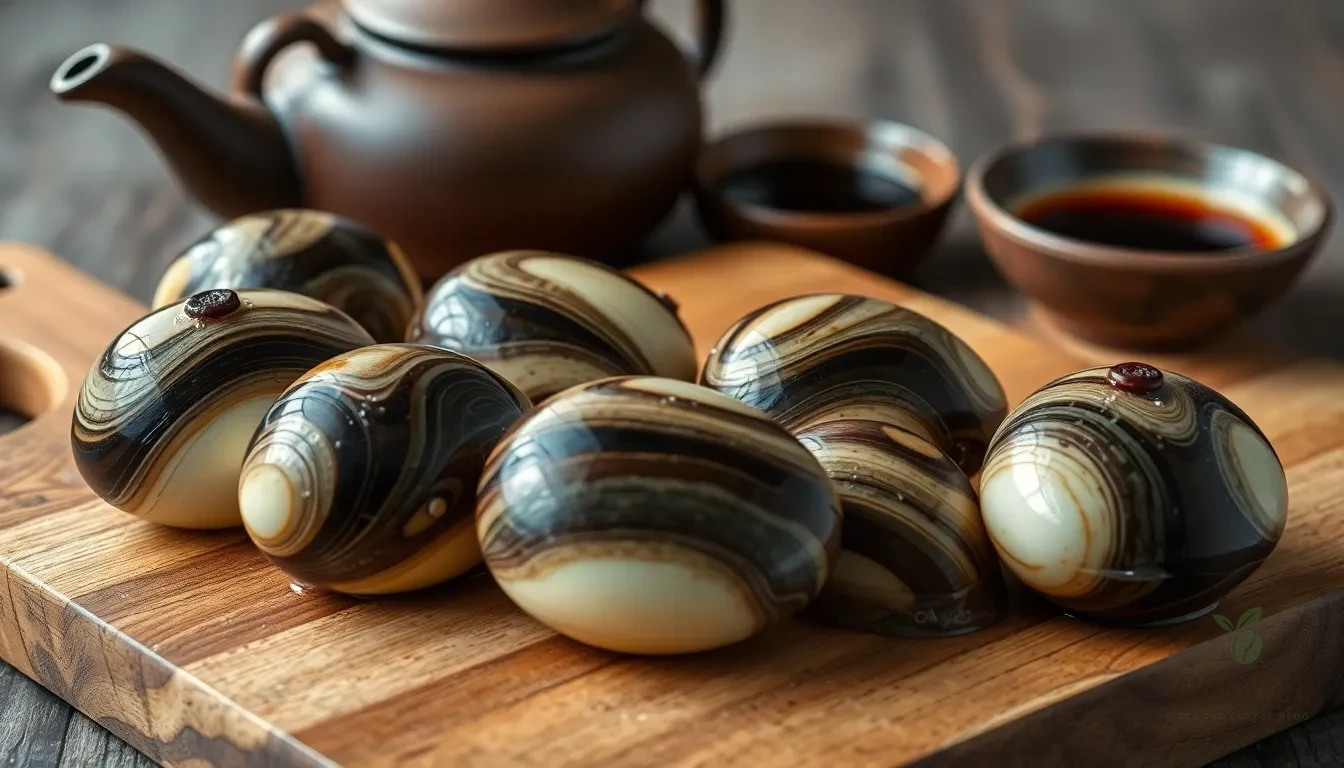
Now that we’ve prepared our marinade and have our cracked eggs ready, let’s focus on the key techniques that will ensure our tea eggs turn out perfectly every time.
Achieving the Marble Effect
The signature marble pattern requires careful attention to the cracking technique and marinade penetration. We create this stunning visual effect by gently tapping the eggs with the back of a spoon or lightly knocking them on a hard surface to form a network of fine cracks throughout the shell. These manageable cracks allow the marinade to seep in slowly and create the beautiful marbled appearance we’re after.
We must avoid removing the shell entirely or creating cracks that are too large, as this prevents even coloring and can result in unsightly patches. The combination of light and dark soy sauces enhances the color contrast, making the marble pattern more pronounced and visually striking.
For optimal results, we simmer the cracked eggs in our marinade for at least one hour, then allow them to steep off the heat. This steeping process can produce vivid marbling even without continuous boiling, particularly when we extend the soaking time to 24 hours. The longer soaking period allows the tea and spices to infuse fully into the egg whites, creating deeper flavor penetration and more dramatic visual effects.
Checking for Doneness
We determine doneness by evaluating both flavor penetration and visual appearance. Our tea eggs are ready when the marinade has permeated through the whites and the marbling pattern is clearly visible throughout the egg.
The minimum recommended cooking time includes one hour of simmering plus several hours of soaking in the marinade. For the best results, we refrigerate the eggs in their marinade for 12 to 24 hours, allowing the flavors to develop fully.
We can test our eggs by carefully peeling one to check the aroma, flavor depth, and marbled pattern before serving the entire batch. The finished eggs should display a beautiful network of brown lines against the white background, accompanied by a rich, savory aroma that combines the tea and spice elements of our marinade.
Storage Instructions
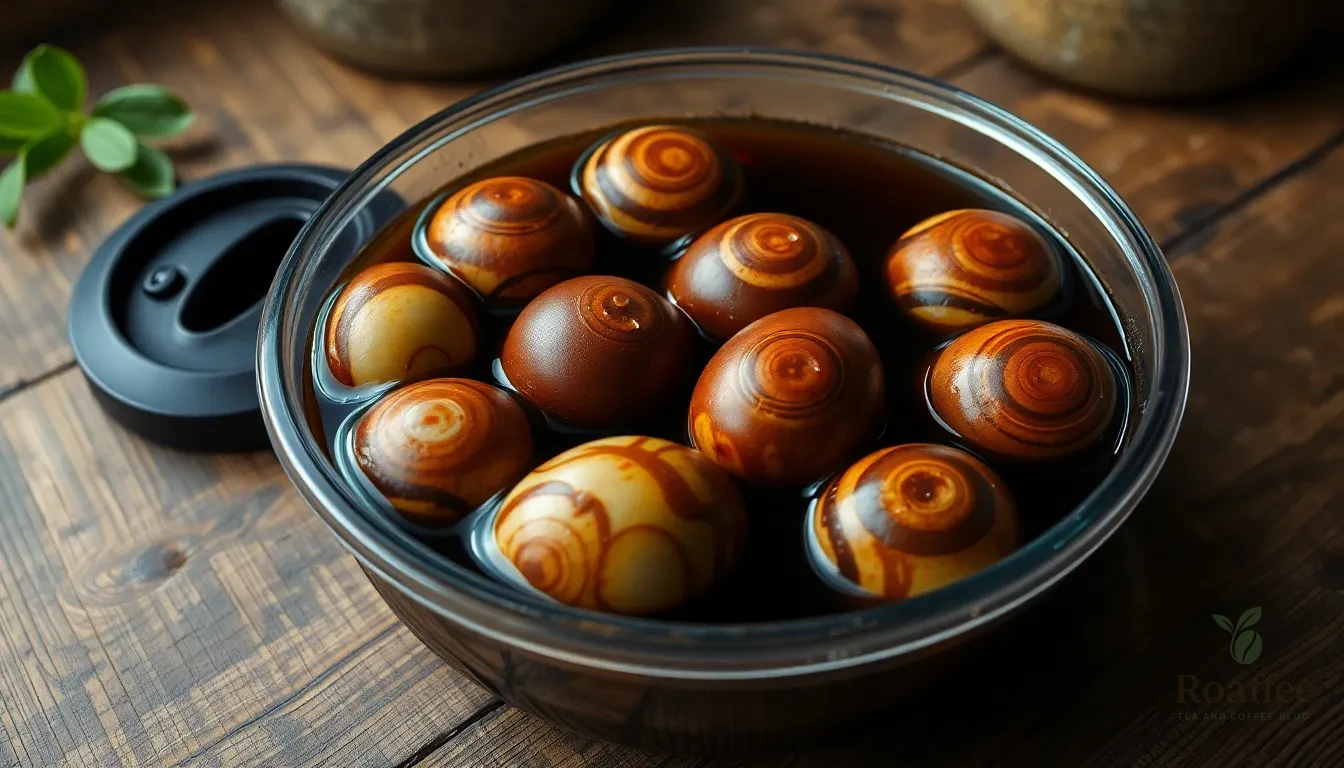
We recommend storing your freshly made tea eggs in an airtight container in the refrigerator to maintain their quality and flavor. The eggs will keep well for 3 to 5 days when properly stored in their marinade or steeping liquid.
For optimal flavor retention, we suggest keeping the eggs submerged in their marinade during storage. This method preserves the rich, savory taste and prevents the eggs from drying out. When stored this way, the eggs continue to absorb the aromatic flavors even while refrigerated.
| Storage Method | Duration | Best Practice |
|---|---|---|
| In marinade | 3-5 days | Keep eggs fully submerged |
| Peeled eggs | 2-3 days | Store in airtight container |
| Marinade alone | Up to 1 week | Refrigerate for reuse |
Peeled tea eggs require more careful handling and should be consumed within 2 to 3 days for best quality. We recommend only peeling the eggs you plan to eat immediately, leaving the rest in their shells within the marinade.
The marinade itself serves as both flavoring and preservative. We can store it separately in the refrigerator for up to a week and reuse it to steep additional batches of eggs. This makes the process more economical and allows us to maintain consistent flavoring across multiple preparations.
Tea eggs offer versatility in serving temperature. We can enjoy them cold straight from the refrigerator, at room temperature, or gently warmed in the remaining marinade before serving. This flexibility makes them perfect for meal prep or spontaneous snacking throughout the week.
Serving Suggestions
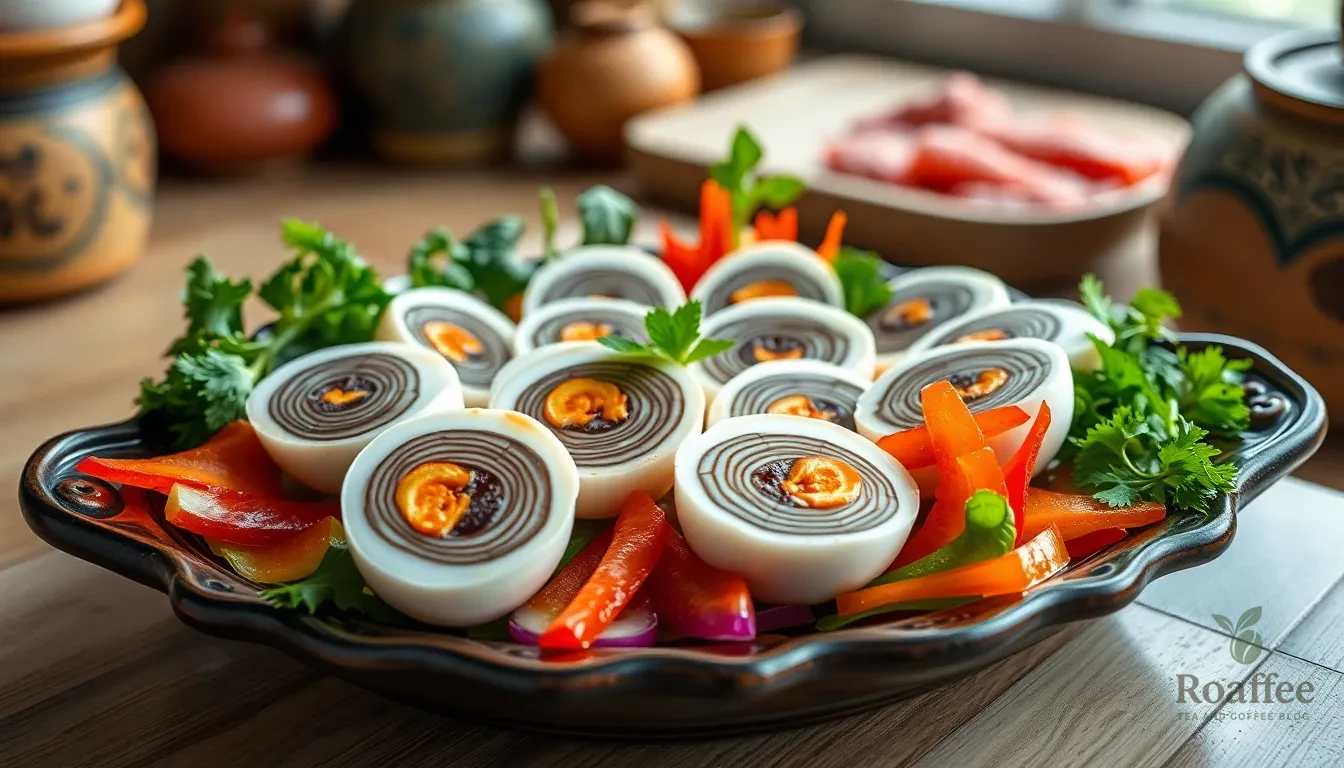
Our marbled tea eggs transform into versatile culinary companions that elevate both casual snacking and formal dining experiences. These protein-rich treats shine brightest when served as a traditional Chinese street food snack alongside steamed rice or noodle dishes.
We recommend presenting tea eggs at room temperature or gently warmed to showcase their complex flavors and stunning marbled appearance. The eggs pair beautifully with congee for breakfast or serve as an elegant appetizer at dinner parties where guests can appreciate their artistic presentation.
For authentic street food style serving, we suggest cutting the eggs in half lengthwise to display the intricate marbling pattern created by the tea and spice marinade. This presentation method allows the beautiful spider web design to become the centerpiece of your dish.
Asian noodle soups benefit tremendously from halved tea eggs placed on top as a protein garnish. The savory umami flavors complement ramen, pho, and other broth-based dishes while adding visual appeal and substantial nutrition to the meal.
We find tea eggs work exceptionally well in bento boxes or lunch containers where they provide sustained energy and flavor. Their compact size makes them ideal for portion control while delivering the satisfying taste that keeps hunger at bay throughout the day.
Cold tea eggs make excellent additions to salads where their firm texture and rich flavor create interesting contrasts with fresh greens. The spiced marinade adds depth to simple lettuce or cucumber salads without requiring additional dressing.
For entertaining, we arrange whole tea eggs on platters with other Chinese appetizers like dumplings or spring rolls. Their distinctive appearance creates conversation starters while offering guests a unique tasting experience that showcases traditional Chinese culinary artistry.
Rice bowls become more substantial when topped with sliced tea eggs alongside pickled vegetables and fresh herbs. This combination creates a balanced meal that highlights the eggs’ savory qualities while providing varied textures and flavors in each bite.
Recipe Variations
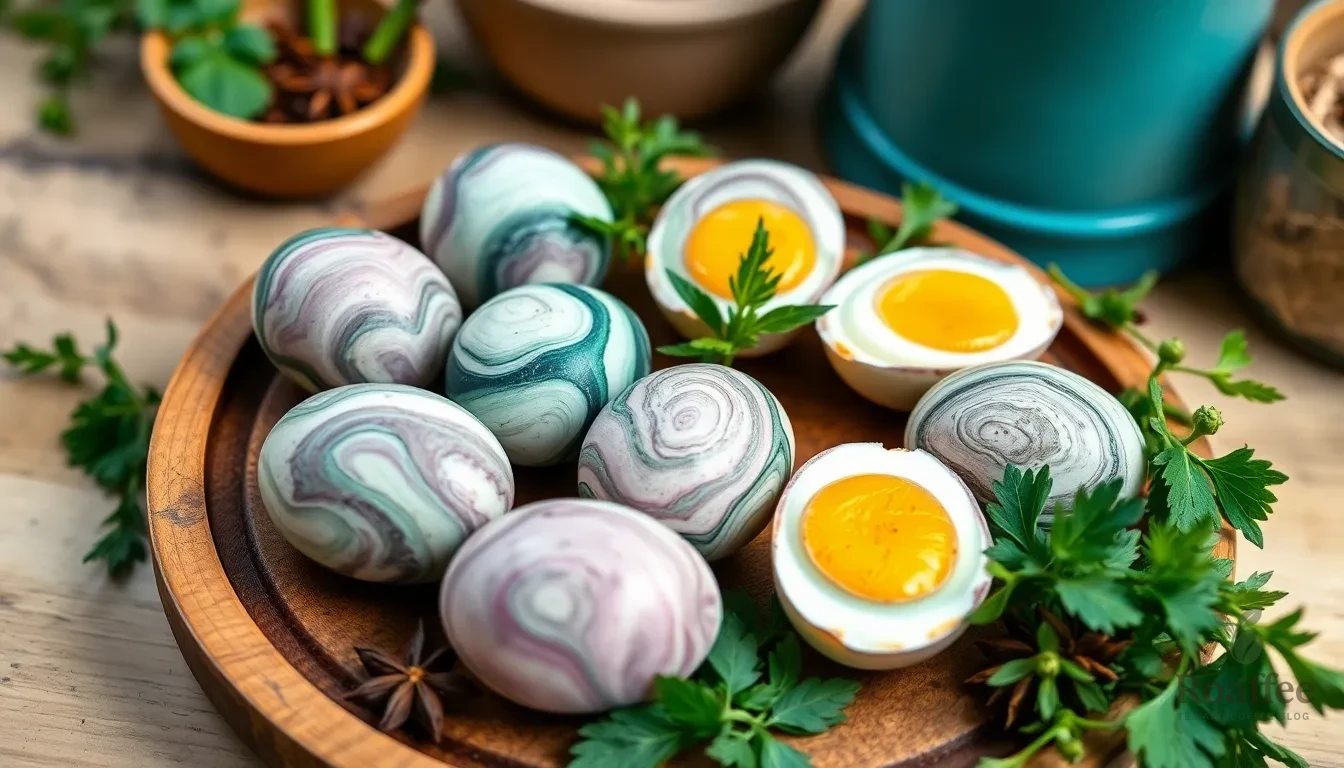
Tea eggs offer incredible versatility through creative adaptations that transform this classic street food into exciting flavor experiences. We can easily customize our marinade to create distinct variations that suit different taste preferences and occasions.
Spicy Tea Eggs
We elevate the heat level by incorporating additional spices that deliver a warming kick without overwhelming the delicate tea flavor. Start by increasing the Sichuan peppercorns or black peppercorns from 1 teaspoon to 2 teaspoons for enhanced numbing heat.
Add 1 to 2 tablespoons of chili flakes directly to the simmering broth for consistent spiciness throughout. Fresh sliced chili peppers provide another excellent option – we recommend using 2 to 3 bird’s eye chilies or jalapeños depending on your heat tolerance.
The spicy variation maintains the same cooking process as our classic recipe but requires careful attention to spice levels. We suggest starting with smaller amounts of heat elements and adjusting during the simmering process to achieve the perfect balance.
Herbal Tea Eggs
We transform our tea eggs into aromatic masterpieces by incorporating additional herbs and spices that create complex flavor profiles. Five-spice powder adds depth when we include 1 to 2 teaspoons alongside our existing spice blend.
Tangerine peel brings citrusy notes that complement the tea base beautifully – we recommend using 2 to 3 pieces of dried peel for optimal flavor infusion. Create a spice bundle by wrapping whole spices like additional cloves nutmeg or cardamom pods in cheesecloth for easy removal after cooking.
For adventurous home cooks we suggest experimenting with unconventional additions like a splash of bourbon or whiskey which adds sophisticated undertones to the marinade. These herbal variations benefit from longer steeping times of 12 to 24 hours to fully develop their complex aromatic qualities.
The beauty of herbal tea eggs lies in their customization potential – we can adjust herb quantities based on personal preferences while maintaining the fundamental cooking technique that creates those stunning marbled patterns.
Make-Ahead Tips
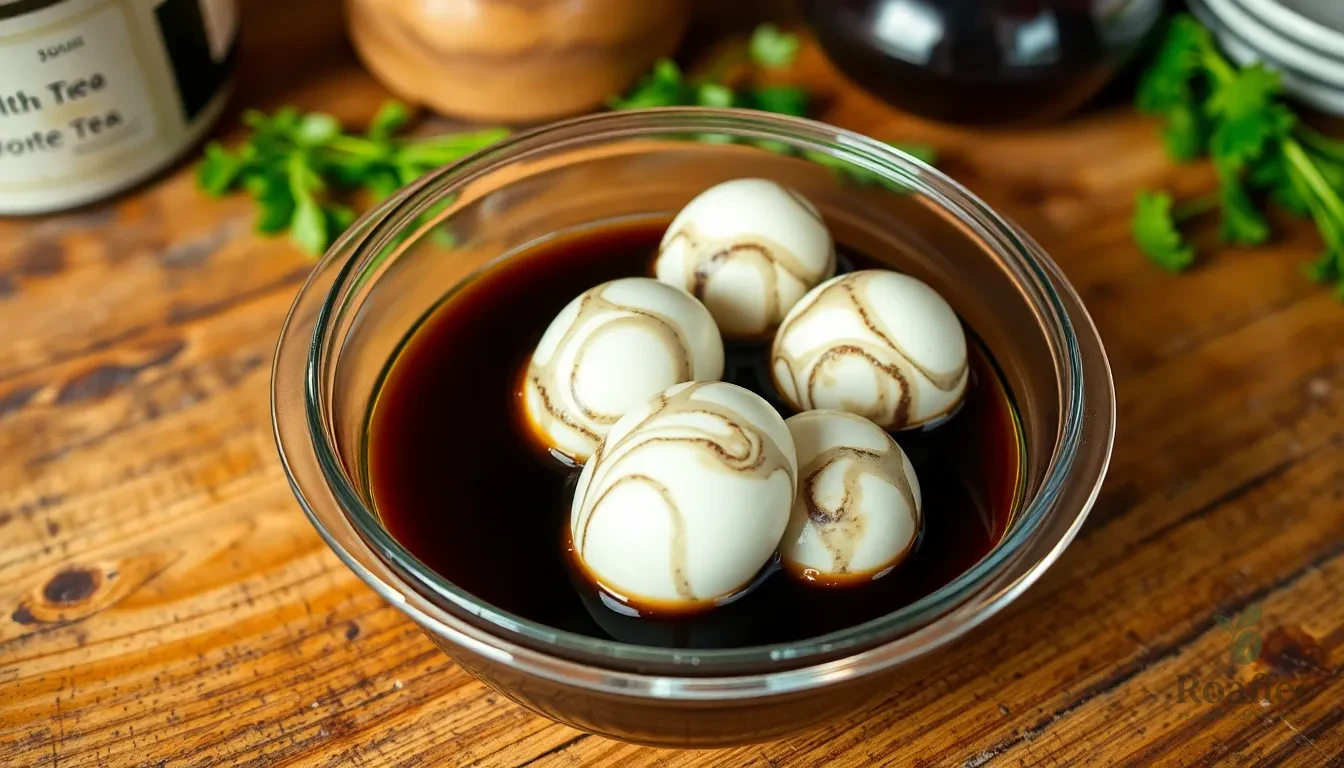
Tea eggs become more flavorful when prepared ahead of time, making them perfect for meal prep or entertaining. We recommend making these marbled beauties up to 4 to 5 days in advance for optimal taste development.
The marinade continues to penetrate the cracked shells during refrigeration, intensifying the savory flavors with each passing day. We store our prepared tea eggs completely submerged in their soy tea marinade inside an airtight container in the refrigerator. This method ensures the eggs remain moist while the complex flavors deepen throughout the storage period.
A smart technique we use involves placing the eggs in a quart sized bag with the marinade, which minimizes the amount of liquid needed while ensuring even coating. The bag method also saves refrigerator space and makes it easier to rotate the eggs occasionally for uniform marbling.
Your marinade can be reused after the initial batch of eggs is consumed. We bring the used marinade to a boil, then cool it completely before storing it in the refrigerator for future use. This reused marinade actually develops more depth of flavor, creating even more delicious tea eggs on subsequent batches.
| Storage Method | Duration | Flavor Development |
|---|---|---|
| Refrigerated in marinade | 4-5 days | Intensifies daily |
| Reused marinade | Up to 1 week | Deeper complexity |
| Quart bag method | 4-5 days | Even distribution |
We keep the shells on during storage to maintain the marbled appearance and prevent the eggs from drying out. Peeling the eggs just before serving maximizes both the visual impact and flavor retention. The shells act as a natural barrier, preserving the moisture while allowing the marinade to continue its work.
Planning ahead transforms these tea eggs from a simple snack into an elegant make ahead appetizer. We often prepare a large batch on Sunday for the entire week, ensuring we have flavorful protein ready for breakfast bowls, lunch additions, or evening snacks.
Conclusion
We’ve shared everything you need to create these stunning marbled tea eggs in your own kitchen. The combination of aromatic spices and patient marinating transforms simple hard-boiled eggs into restaurant-quality appetizers that’ll impress your family and friends.
The beauty of tea eggs lies in their versatility – whether you’re meal prepping for the week or preparing an elegant party platter they adapt to any occasion. The make-ahead nature means you can enjoy the fruits of your labor for days while the flavors continue to develop.
Now it’s time to gather your ingredients and start cracking those shells. Your kitchen will smell incredible and you’ll have a delicious snack that bridges comfort food with gourmet presentation. Happy cooking!
Frequently Asked Questions
What are tea eggs?
Tea eggs are a popular Chinese street food featuring hard-boiled eggs with a beautiful marbled appearance. They’re created by cracking the shells of boiled eggs and simmering them in a flavorful mixture of soy sauce, star anise, and black tea. This process creates stunning visual patterns while infusing the eggs with complex umami flavors reminiscent of Taiwan and Hong Kong street cuisine.
What ingredients do I need to make tea eggs?
For the marinade, you’ll need water, dark and light soy sauce, brown sugar, black tea, star anise, cinnamon, five-spice powder, salt, garlic, and ginger. Optional ingredients include dried shiitake mushrooms and Shaoxing wine. For boiling the eggs, you’ll need large eggs, water, white vinegar, and ice water for cooling.
What equipment is required for making tea eggs?
Essential equipment includes a medium to large pot for boiling and simmering, slotted spoons or tongs for handling hot eggs, a bowl for an ice water bath, and a regular spoon for creating shell cracks. You’ll also need a container with a tight-fitting lid for marinating and measuring cups and spoons for accurate ingredient proportions.
How do I create the perfect marble effect?
Gently crack the cooled hard-boiled eggs to create a spider web pattern without making large breaks. Simmer the cracked eggs in the marinade for at least one hour, then steep them off heat for optimal flavor penetration. For deeper marbling and flavor infusion, soak the eggs for up to 24 hours in the refrigerator.
How long can I store tea eggs?
Store freshly made tea eggs in an airtight container in the refrigerator for 3 to 5 days, ideally submerged in their marinade. Peeled eggs should be consumed within 2 to 3 days, while the marinade can be refrigerated for up to a week for reuse. Keep shells on during storage to maintain the marbled appearance.
How should I serve tea eggs?
Tea eggs are versatile and can be served cold, at room temperature, or gently warmed. Cut them in half to showcase their marbling and serve alongside steamed rice, noodle dishes, or as garnish in Asian soups. They’re perfect for bento boxes, breakfast with congee, or as elegant appetizers on platters with other Chinese dishes.
Can I make different variations of tea eggs?
Yes! Create spicy tea eggs by adding Sichuan peppercorns or chili flakes. Try herbal versions with tangerine peel and extra five-spice powder. For unique flavors, experiment with bourbon or whiskey additions. All variations follow the same basic cooking technique but may require longer steeping times for full flavor development.
Can I make tea eggs ahead of time?
Absolutely! Tea eggs actually improve in flavor when made in advance, making them perfect for meal prep. Prepare them 4 to 5 days ahead for optimal taste development. Store in quart-sized bags to minimize liquid use while ensuring even coating. Keep shells on during storage and peel just before serving for maximum visual impact.

